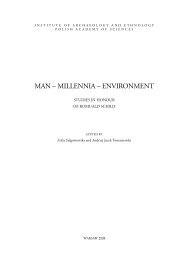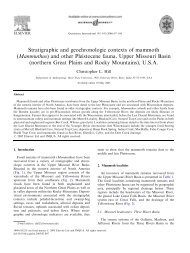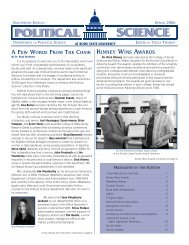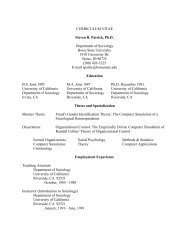From Incivility to Outrage - College of Social Sciences & Public ...
From Incivility to Outrage - College of Social Sciences & Public ...
From Incivility to Outrage - College of Social Sciences & Public ...
Create successful ePaper yourself
Turn your PDF publications into a flip-book with our unique Google optimized e-Paper software.
Downloaded by [Boise State University] at 17:30 21 December 2011<br />
Political Communication, 28:19–41, 2011<br />
Copyright © Taylor & Francis Group, LLC<br />
ISSN: 1058-4609 print / 1091-7675 online<br />
DOI: 10.1080/10584609.2010.542360<br />
<strong>From</strong> <strong>Incivility</strong> <strong>to</strong> <strong>Outrage</strong>: Political Discourse<br />
in Blogs, Talk Radio, and Cable News<br />
SARAH SOBIERAJ and JEFFREY M. BERRY<br />
Most research on incivility in American politics focuses on its effects on citizens’ political<br />
attitudes and behaviors, in spite <strong>of</strong> remarkably little data on the extent <strong>to</strong> which<br />
political discourse is actually uncivil. Those studies that do examine content focus<br />
on negative campaign advertisements, overlooking more egregious forms <strong>of</strong> political<br />
incivility that penetrate the broader media landscape. In this study, we attempt <strong>to</strong><br />
conceptualize and measure more dramatic types <strong>of</strong> political incivility, which we term<br />
“outrage.” <strong>Outrage</strong> discourse involves efforts <strong>to</strong> provoke a visceral response from the<br />
audience, usually in the form <strong>of</strong> anger, fear, or moral righteousness through the use <strong>of</strong><br />
overgeneralizations, sensationalism, misleading or patently inaccurate information, ad<br />
hominem attacks, and partial truths about opponents. Scrutinizing 10 weeks <strong>of</strong> data<br />
from political blogs, talk radio, and cable news analysis programs, we demonstrate<br />
that outrage discourse is extensive, takes many different forms (we examine 13 different<br />
types), and spans media formats. We also show that while outrage tactics are largely<br />
the same for liberal and conservative media, conservative media use significantly more<br />
outrage speech than liberal media. It is our hope that introducing more concrete information<br />
about the actual content <strong>of</strong> political media will render existing research on<br />
potential effects more meaningful.<br />
Keywords talk radio, blogs, political commentary, infotainment, polarization,<br />
political culture, incivility<br />
Maybe you aren’t aware <strong>of</strong> the link between the churches in your community and Nazism.<br />
Syndicated radio host and Fox Cable News commenta<strong>to</strong>r Glenn Beck may be helpful in<br />
this regard:<br />
I beg you, look for the words “social justice” or “economic justice” on your<br />
church Web site. If you find it, run as fast as you can. <strong>Social</strong> justice and economic<br />
justice, they are code words. Now, am I advising people <strong>to</strong> leave their<br />
church? Yes! (March 2, 2010)<br />
Sarah Sobieraj is Assistant Pr<strong>of</strong>essor in the Department Sociology at Tufts University. Jeffrey<br />
M. Berry is John Richard Skuse Pr<strong>of</strong>essor in the Department Political Science at Tufts University.<br />
An earlier version <strong>of</strong> this article was presented at the annual meeting <strong>of</strong> the American<br />
Sociological Association, San Francisco, August 2009. This research has received generous support<br />
from the Bernstein Faculty Fellows Program at Tufts University. Special thanks <strong>to</strong> research<br />
assistants Kevin Lownds, Griffin Pepper, Miriam Umana, and Yuanzhi Gao. Thanks also <strong>to</strong> Anna<br />
Sandoval, Frinde Maher, Julie Nelson, Paul Joseph, Susan Ostrander, and the anonymous reviewers<br />
for their helpful feedback.<br />
Address correspondence <strong>to</strong> Sarah Sobieraj, Tufts University, Department <strong>of</strong> Sociology, 114<br />
Ea<strong>to</strong>n Hall, Medford, MA 02155, USA. E-mail: sarah.sobieraj@tufts.edu<br />
19







